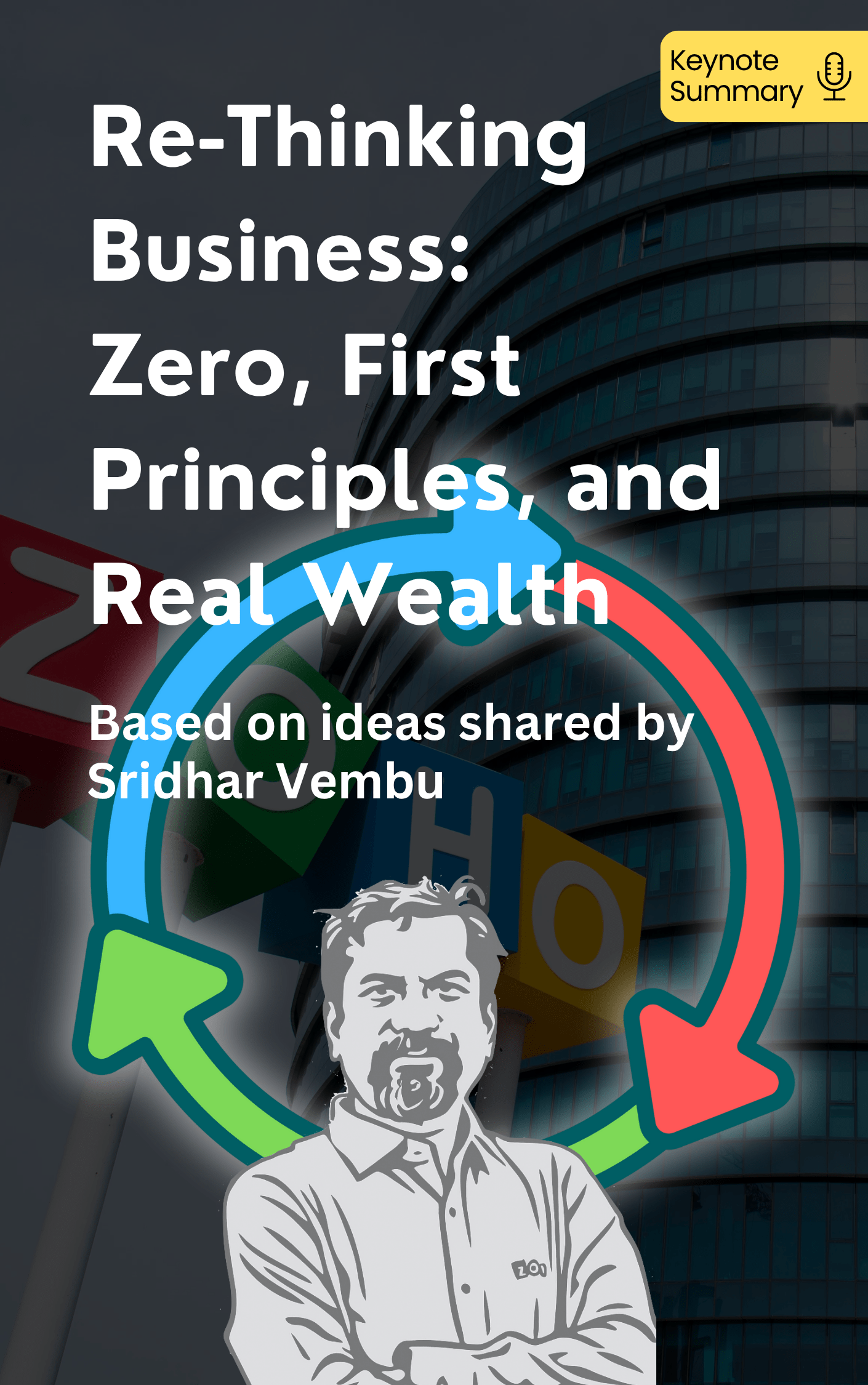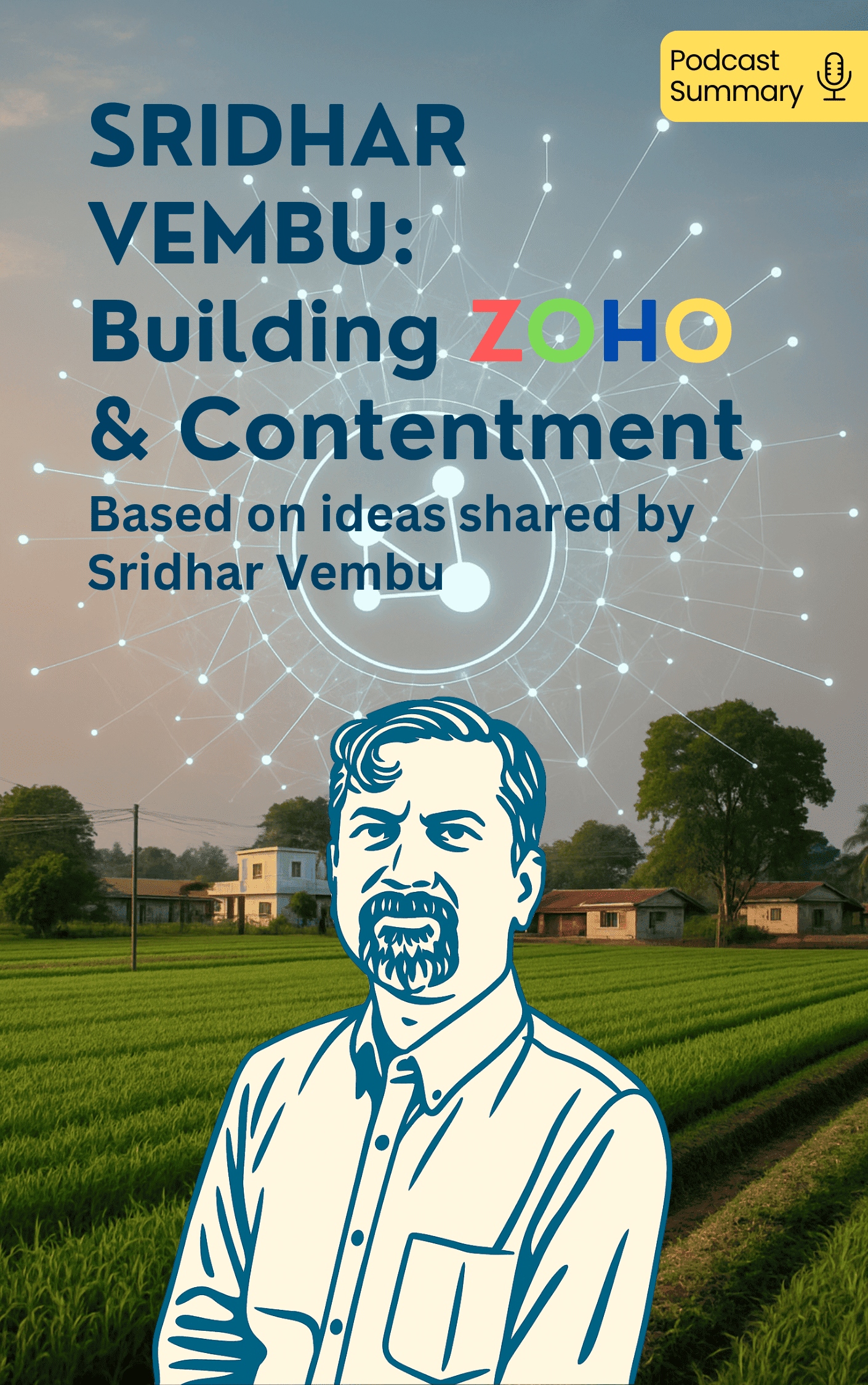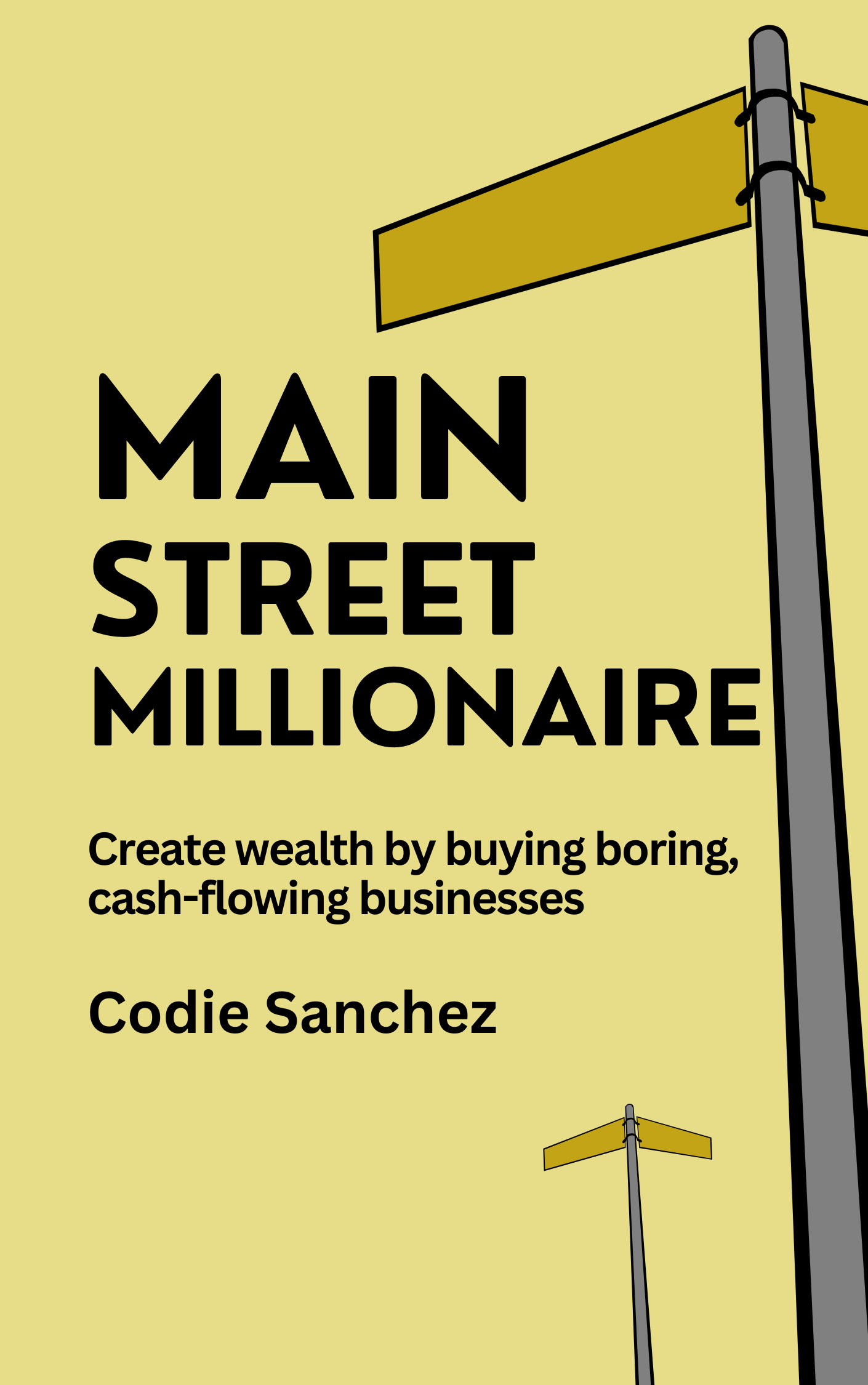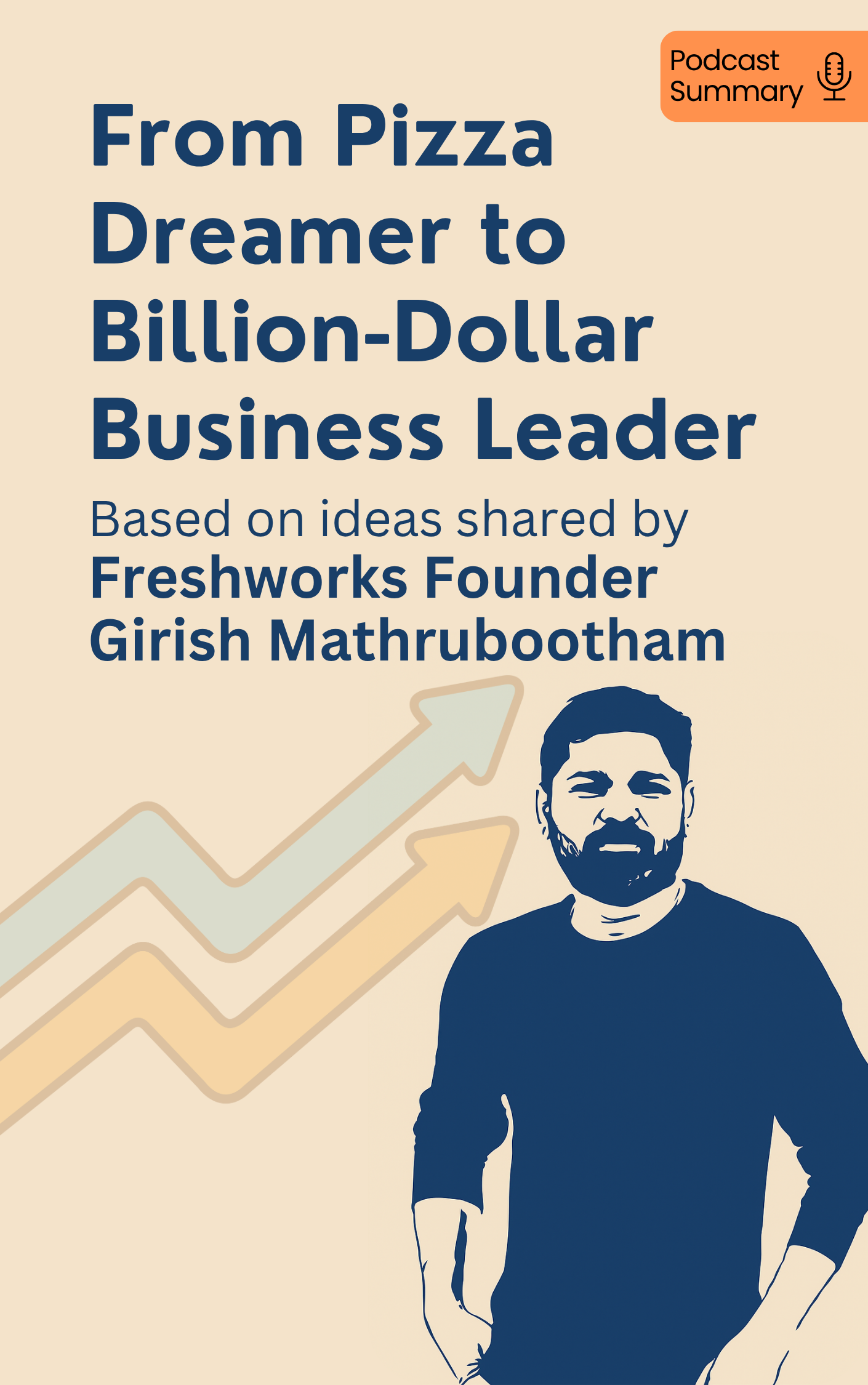Introduction
This summary takes readers into the mind of Sridhar Vembu, the visionary founder and CEO of Zoho, whose unconventional insights challenge nearly every norm of modern business thinking. Through his candid reflections, Vembu dismantles the myths of traditional business education, introduces the power of the “zero mindset” in entrepreneurship, and redefines what true success means.
He questions blind reliance on forecasting, calls for direct communication within organisations, and urges leaders to focus on continuous improvement rather than short-term wins. Along the way, he offers sharp perspectives on the rise of AI, the real meaning of wealth, and the balance between social purpose and financial ambition.
First, we delve into Vembu's staunch critique of traditional business education.
The Flaws of Traditional Business Education and the MBA Trap
Sridhar Vembu holds a staunch and critical view of conventional business education, advocating that "every last business school should be shut down mercilessly". He posits that business "must be experienced" and "cannot be taught in a classroom". Vembu dismisses academic works, including his own, as "fraud" and "prestigious bullshit".
He offers an "entrepreneurial hack" by stating that if a CEO embodies "pure MBA bullshit", that company becomes an "easy competition" and a "good company to compete with". He believes such companies can be "destroyed in the market". As an example, he labels Salesforce as "pure BS" with "not much technology there," making it "much easier to compete with". Vembu challenges the notion of business professors teaching business, suggesting that "if those props are so good they should start a business" themselves. He argues that "there is nothing in the business school that is anything mysterious. Go start a business instead".
Moving beyond traditional education, Vembu advocates for an unencumbered mind, starting from 'zero'.
Embracing the "Zero" Mindset and First Principles
For any new entrepreneur or venture, Vembu stresses the importance of starting with a "zero" mindset: "zero revenue, zero employees, zero everything". He proclaims that "zero is the starting point of everything", encouraging a "fresh pattern of thought". A crucial initial step is to "remove all the preconceived notions that I know anything mental illusion", which he likens to the Zen master's advice to "empty the cup" before learning.
This philosophy aligns with Elon Musk's concept of starting from "first principles" – questioning assumptions and building knowledge from the ground up. Vembu explains that even at Zoho, they are "always failing in something", and whenever they enter a "new business or any new product anything”, they “are at zero again". He highlights that one of the nice things about Zoho is you're always at zero in some aspect, fostering continuous fresh thinking.
This 'zero' mindset is crucial, especially when navigating the dual nature of entrepreneurial pursuits.
The Dual Modes of Entrepreneurship: Exploration and Harvest
Entrepreneurship, according to Vembu, operates in two distinct modes: "exploration" and "harvest". He also refers to these as "seeding and harvesting". The exploration phase involves venturing into new areas, often starting from a "zero state", which inherently includes "testing testing testing testing" and often failing. An example given is their manufacturing business, which is currently "exploring," at "zero revenue," and has "made zero revenue" while attempting to compete with Japanese or German products.
The "harvest" mode, on the other hand, is about generating sufficient income from existing, successful ventures to "eat right and to invest in the new exploration". Vembu admits that Zoho is "always failing at many things" in its exploration endeavours, with the goal that the "failures are small and your successes are bigger than failures". He emphasises the necessity for entrepreneurs to cultivate a mind capable of thinking in these "dual modes of thought".
However, regardless of the mode, Vembu warns against the illusion of foresight.
The Futility of Forecasting and Projections
Sridhar Vembu outright rejects the practice of business forecasting and projections, declaring them "all bullshit". He asserts that "nobody can predict anything" in the global economy, citing unpredictability of factors like trade tariffs. He notes that even "Warren Buffett does not believe in any projections he only looks at the past", aligning with Steve Jobs's idea of "connecting the dots backward".
Vembu states that "increasingly I don't believe in projections" and also acknowledges the inability to "predict timelines" for work. He shares a personal insight that "most important things don't come on our schedule" and that he has "made more breakthroughs after I thought I'm done with an area than before". This perspective suggests that attempting to precisely predict the future is a "waste of time".
Indeed, true innovation, as Vembu suggests, embraces continuous improvement rather than static predictions.
Continuous Perfection and "Never Finished" Work
Drawing inspiration from a "Japanese attitude," Vembu describes work as a "work in progress" that is "never finished," constantly undergoing "increasing perfection over time". He highlights that significant breakthroughs often occur "after I thought I'm done with an area than before", underscoring the iterative nature of innovation.
While work is a continuous journey of improvement, he acknowledges that at some point, one must make a judgment to ship a product. However, he asserts that subsequent iterations will violate how most companies are run today, implying that traditional companies might resist the idea of continuous, post-launch improvements that challenge initial product definitions.
Continuous perfection also demands an unfiltered flow of information, a challenge often stifled by traditional corporate structures.
The Criticality of Direct Information Flow and Avoiding Traps
Vembu believes that as a company expands, the hardest challenge is ensuring that crucial information, especially bad news, directly reaches decision-makers. He criticises hierarchical corporate structures and executive rooms, viewing them as a "good way to screw yourself" by preventing vital information from flowing upwards. He highlights that many companies' "decision makers put themselves in that situation" where they "don't even know how employees feel" or "how customers feel".
He gives an example of meeting a senior official whose "hierarchy is preventing information from reaching you". Vembu warns about the inherent traps in life and leadership, stating that "prestige is a trap" and "life supplies you lot of free traps, free prisons". He stresses that leaders must learn to "not get caught in the trap" to ensure a "freeing the mind" approach. He concludes that "most failures come from these traps".
These structural traps become even more pronounced when considering the seismic shifts AI is poised to bring to the job market.
The Transformative Impact of AI on Jobs
Sridhar Vembu strongly asserts that AI is rapidly becoming proficient in routine programming tasks, which he states "dominates programming". He foresees a significant reduction in the need for human programmers, predicting that if 80% of programming can be automated, there will be "80% fewer people" required.
He draws a powerful analogy to the textile industry, where "hand-weaving code" (software development) is being replaced by "powerful machine looms" (AI). Vembu unequivocally states that software engineers "don't have a birthright to get a high paying job" or retain one, just as weavers or farmers lost theirs due to technological advancements. He anticipates that AI's productivity gains will either lead to software consumption going up or prices crashing - or, if prices remain constant, then "fewer people will get employed". This impact, he notes, will extend beyond software to professions like chartered accountants, lawyers, and artists.
With such changes on the horizon, Vembu redefines what truly constitutes wealth and employment, especially for a nation like India.
Redefining Wealth and Employment for India's Future
Given India's immense population, with "1.4 billion people 23 million babies a year", Vembu stresses that the nation's primary focus must be on "how to create employment, how to create the talent pool, how to create the skills problem solving skills". He points out that many Indian tier 2 cities are actually larger than most American cities or even entire countries like Estonia and Lithuania.
Vembu advocates for a broader definition of wealth that goes beyond financial markets. He defines real wealth as having nice trains and parks, and decent quality of life. He suggests that future high-paying jobs might not necessarily be in technology, but in fundamental, life-sustaining areas like becoming a soil expert or water expert, as these are essential and "AI cannot produce water" nor can it replace the need for healthy soil.
Redefining wealth also requires a strong resolve and an unwavering commitment to one's principles.
The Power of Stubbornness and Standing Your Ground to Prove Truths
Vembu firmly believes in the necessity to "be stubborn and uncompromising" and to "stand your ground" when facing challenges or seeking to establish new realities. He cites Zoho's own experience in proving that "products cannot be built in India," a belief once held by "very respected senior people".
He also applies this principle to Zoho's recruitment strategy, making a deliberate choice to open new offices outside of Chennai and recruit from there. Despite initial doubts that people would not relocate, Zoho found no difficulty in recruitment. Vembu considers this a "major service to Chennai" by alleviating overcrowding and traffic in the city, demonstrating how standing one's ground can prove a truth and yield positive outcomes.
Such commitment, however, often clashes with the impatient demands of conventional financial capital.
The Challenge of Patient Capital for Social Movements
Vembu highlights a fundamental conflict: "financial capital and patient capital don't mix". He explains that financial capital operates on an insatiable "treadmill," constantly demanding ever-increasing profits. For example, Google and Microsoft, which "make about $350 million profit per day," yet their leaders are still expected to "show a path for how to double this in the next 10 years". For financial capital, "no amount is ever enough".
He contrasts this with ventures focused on social or cultural movements, which require "patient capital". Vembu advises that such movements "cannot find it financially" from typical investors. Instead, they must "seek other sources," specifically "people who are interested in the present that is not capital in a sense of return, it's capital in sense of real building of our social assets".
Summary
We have traversed Sridhar Vembu's distinctive and often counter-intuitive perspectives on business, technology, and societal progress. His insights offer a stark contrast to conventional wisdom, providing a refreshing and pragmatic lens through which to view entrepreneurial challenges and future opportunities.
Vembu's insights challenges you to think critically, embrace uncertainty, and prioritise genuine societal value over fleeting financial metrics. His discourse serves as a powerful reminder to question assumptions and to build, not just for profit, but for enduring impact.










